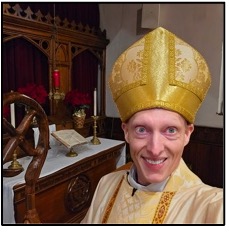Bulletin Insert: Reflections on the Resurrection, Week 4 – May 11, 2025

During the Easter season, Sermons That Work is pleased to present reflections from some of the newest bishops of The Episcopal Church on the resurrection of our Lord. Check back each week for a brief exploration of how Jesus Christ’s rising from the grave changes everything. To listen to this reflection, scan the QR code on this page and subscribe to the Sermons That Work podcast.
Easter first happened in a cemetery. Not under the sparkling sunlight of a spring morning. Not in a field of pastel tulips. Not tangled in a prolonged cellophane celebration. Easter happened in a cemetery. Surrounded by death. Incubated by stubborn shadows. Carried in a broken heart. Greeted quite unexpectedly by a woman who no longer dreamed dreams.
Mary Magdalene was a brave, bold woman. But even brave, bold women can be devastated by the shocking violence of this world. And on Easter morning, she was devastated. Though there was breath in her lungs and blood in her heart, in a way, Mary died with Jesus – because violence is never an isolated incident; there is always collateral damage; it spreads like a disease.
But resurrection is contagious too. And on Easter, Mary came back to life with Jesus. In a cemetery, in the midst of death, there was life. Pulsing with resurrection, Mary was brave enough to see more than emptiness in the empty tomb. She had the courage to be the first citizen of the Easter world to show her resurrection, to walk her tear-stained cheeks into a locked room of downcast disciples, who knew nothing but the empty tomb, who had not yet experienced resurrection life, and testify: “I have seen the Lord!”
It was a stunningly audacious statement given the circumstances. She journeyed to the graveyard to visit a corpse. She found the body missing. Before she ever spoke a word about resurrection, she told a story of grave robbers. And as that bad situation grew worse, she lingered to weep while the guys went home.
But then Easter happened, in a cemetery, where the dying and the burying happen. Because that was where Easter was needed. And it is still needed. In this Good Friday world, in this world in which the dying and the burying happen, in this world in which despair holds a place of prominence, we need a Church that has experienced Easter, and has felt the breath of the Risen Christ. We need Christians who are brave enough and bold enough to show the world their resurrection.
We do not have to settle for a Good Friday world. We do not have to accept the death and violence, the nightmares and the despair. We do not have to resign ourselves to the scourge of war, to the plague of addiction, to shelter-in-place drills in kindergarten classrooms, to partisan discord, to racism and hateful prejudice. Those things are all too real, but they are not the reality God wants for us or for this world.
And that is the miracle of Easter: Easter happens in this world, with these heartaches. Easter happens in the shadow of the cross. It happens in the cemetery. It is watered by tears. It does not deny the reality of pain and death; Easter defies pain and death. It is the sun that scatters the clouds. It is a dream so much truer than any nightmare.
The Easter God is daring us to dream that impossible dream. To believe that impossible dreams can come true. In this world. God is calling us to listen for the voice of the Risen Christ, still whispering resurrection, still speaking forth new life in this world. Jesus is still telling that ancient and eternal story – a story in which love wins, and life is stronger than death, and hope is never in vain.
This is the story that means to transform your life and spill from your lips. Be brave enough to see more than emptiness in that empty tomb; be daring enough to dream impossible dreams. And then be foolish enough to live as if those dreams will come true.

The Rt. Rev. Jeremiah D. Williamson is the tenth Bishop of the Episcopal Diocese of Albany. He is married to Jennifer, a United Methodist pastor. They have two sons and a small dog.
Don’t forget to subscribe to the Sermons That Work podcast to hear this sermon and more on your favorite podcasting app! Recordings are released the Thursday before each liturgical date.
Receive Free Weekly Sermons That Work Resources!


